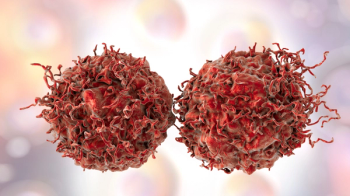
An expert discusses the FDA approval of obecabtagene autoleucel—the only CAR T-cell therapy given via split dosing for patients with ALL.

An expert discusses the FDA approval of obecabtagene autoleucel—the only CAR T-cell therapy given via split dosing for patients with ALL.

The FDA approved a companion diagnostic to identify patients with biliary tract cancer eligible for treatment with zanidatamab.

Larotrectinib led to rapid/durable responses and high disease control rates in children with TRK fusion-position central nervous system cancers.

The FDA approved an oral solution of imatinib for multiple different cancer types.

Oncology nurses “play a pivotal role in guiding patients” through the genetic testing process, an expert explained.

Most patients with triple-negative breast cancer experienced a protocol-defined immune response with an investigational vaccine, phase 1 data showed.

The FDA received a biologics license application for accelerated approval of RP1 plus nivolumab for advanced, pretreated melanoma.

PARP inhibitors have changed the way we think about [managing] ovarian cancer,” Whitney Goldsberry, MD, said

The FDA accepted a supplemental new drug application to darolutamide plus androgen deprivation therapy for metastatic hormone-sensitive prostate cancer.

The FDA approved an updated drug label for fludarabine phosphate for the treatment of B-cell chronic lymphocytic leukemia.

Approximately one-third of patients with pancreatic cancer and anxiety had a palliative care consultation, data showed.

The FDA granted an accelerated approval to zanidatamab-hrii for previously treated, unresectable or metastatic HER2-positve biliary tract cancer.

The FDA granted a fast track designation to ALE-P02 for patients with CLDN1-positive squamous solid tumors.

Clinicians should consider a rapid taper approach for patients with cancer who exhibit repeated signs of opioid misuse, an expert said.

Subcutaneous pembrolizumab plus chemotherapy was noninferior to IV pembrolizumab plus chemotherapy in treatment-naïve non-small cell lung cancer.

Bendamustine plus obinutuzumab outperformed historical data of bendamustine plus rituximab for patients with treatment naïve mantle cell lymphoma.

While bispecific antibodies tend to be well-tolerated for patients with multiple myeloma, there are still adverse effects clinicians should discuss with their patients.

Sacituzumab tirumotecan had antitumor activity in pretreated advanced endometrial and ovarian cancer, data showed.

Mirdametinib led to confirmed responses and meaningful pain and health-related quality of life improvements in both children and adults with neurofibromatosis type 1-associated PNs.


The FDA approved ninlotinib tablets that do not have mealtime restrictions for Ph-positive CML in chronic phase and CML that was previously treated.

The FDA granted elraglusib a rare pediatric disease designation for Ewing sarcoma based on findings from the 1/2 Actuate-1902 trial.

Real-world data showed differences in outcomes by race/ethnicity in elderly patients.

Five-fraction SBRT was noninferior to radiotherapy in a phase 3 trial of patients with low- to intermediate-risk localized prostate cancer.

At a recent Community Case Forum, an expert discussed the risk of cytokine release syndrome after patients undergo CAR T-cell therapy.

The FDA received a biologics license application for datopotamab deruxtecan for previously treated EGFR-mutant non-small cell lung cancer.

Topical treatments may help ease chemotherapy-induced peripheral neuropathy, but more research is needed.

Adding E-602 to cemiplimab demonstrated anti-tumor effects in patients PD-L1–resistant solid cancers.

Anitocabtagene autoleucel may be a promising CAR-T cell therapy option for patients with relapsed/refractory myeloma.

With many patients utilizing medical cannabis, it is important for nurses to be aware of potential drug-drug interactions, an expert said.